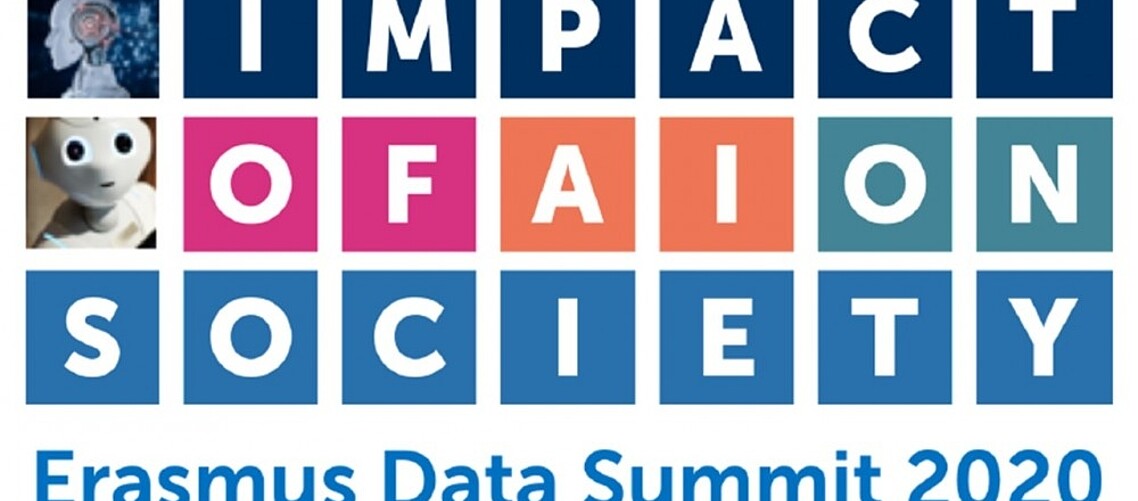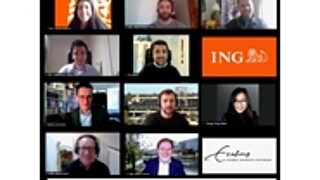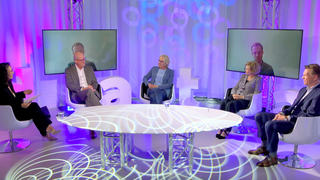Keynote speakers Frans Muller, CEO of Ahold-Delhaize and Hans-Aloys Wischmann, Program Manager Artificial Intelligence at Philips outlined the changes and challenges they see ahead in retail, energy, health care and more, all driven by advances in AI. More perspectives were described by 12 Erasmus University faculty members in the breakout sessions that followed the plenary opening of the Erasmus Data Summit.
Navigating the crisis
The first weeks of the pandemic in March and April 2020 were marked by empty supermarket shelves, a disrupted supply chain and broken forecasting algorithms. But not for long: keynote speaker Frans Muller, CEO of Ahold-Delhaize explained how his organisation quickly leveraged its data and AI capabilities to solve these problems and navigate through the crisis. Muller also talked of the value contactless payments, frictionless pay-outs, and online ordering, which has proved its worth during this difficult period, and how this has indicated the direction for retailers in the future.
AI in the care of chronic diseases
Given that the World Health Organization (WHO) predicts an increase in patients with chronic diseases in the near future, how will we ensure their care when a shortage of healthcare professionals is also forecast? Keynote speaker Hans-Aloys Wischmann, Program Manager Artificial Intelligence at Philips described how AI will be part of the solution, thanks to its ability to extract new insights from the thousands of exabytes of health data generated annually.
10 Expert tracks
Breakout sessions continued the exploration as experts from Erasmus University Rotterdam described the impact of AI on their respective fields.
AI & legal personality
Advances in technology repeatedly blur the lines of responsibility, accountability, and liability in situations in which there are legal disputes, according to Professor Klaus Heine from the Erasmus School of Law. The current legal system needs reformation to tackle these challenges.
Audit of algorithms
Algorithms are not perfect – and can sometimes even be biased, said Dr Otto Koppius from the department of Technology and Operations Management and Dr Iuliana Sandu from the department of Accounting and Control at RSM. To prevent unfair discrimination against certain customers, the only algorithms that should be permitted are those that serve the organisational purpose without causing negative effects for any of the organisation’s stakeholders.
COVID-19 and beyond
The pandemic has turned the world upside down, said Prof. Peter van der Spek, Principal Investigator in the department of Pathology at Erasmus Medical Center. He discussed a technical aspect of the crisis, emphasising the importance of openness in the collection and aggregation of health data used to study biological processes. Aggregation is particularly important when applying AI methods to extract information from data.
Digital solutions for COVID-19
Dr Jeffrey Sweeney from RSM’s department of Technology and Operations Management explained how digital solutions including smartphone apps have enabled citizens to combat the virus but are accompanied by privacy concerns.
Future of energy systems
Dr Yashar Ghiassi-Farrokhfal from RSM’s department of Technology and Operations Management explained how energy systems are being revolutionised with a paradigm shift away from centralised and fossil-based power generation towards clean, locally generated power. Technology will play an increasingly important role in the intelligent design of local microgrids; its role is underpinned by three main pillars: digitalisation, decentralisation, and decarbonisation.
Policy & management of data-driven healthcare
Professor Antoinette de Bont from the Erasmus School of Health Policy & Management explained what is needed for data-driven care using analytics to be used to cut treatment time in the management of chronic diseases. She argued that it can be used in tracking infections as well as in deep imaging for precision diagnostics. There will be new roles for technology companies, for hospitals, and for citizens.
Competing in the age of AI
Professor Ting Li of RSM’s department of Technology and Operations Management and her team have observed a couple of important shifts in focus. In business operations, a transition will take place from a focus on process to a more customer-oriented way of operating. In algorithms, there is a shift away from efficiency and automation towards transparency and equity, fairness and inclusivity.
Open banking and the potential role of AI
Dr Dion Bongaerts from RSM’s department of Finance explained how Fintech and Big Tech are revolutionising the banking industry by introducing the new system of Open Banking, with widely available bank transaction data that can be obtained by non-banks and third parties. Combined with other data, e.g. Google search history, it presents an opportunity for new and existing players to improve existing products and create new ones.
Human judgement in the age of AI
The role of human labour in the age of AI will change forever, said Professor Stefano Puntoni from RSM’s department of Marketing Management. AI will play a formative role in how work and creativity evolve. A new decision-making framework makes a novel division of labour, separating functions not by whether they should be run entirely by a human or a machine, but by using cognitive building blocks, and by assigning steps to either humans or machines to increase the effectiveness of their processes.
AI for effective and responsible social networking campaigns
Sometimes we forget that data is about humans, said Professor Moniek Buijzen and Dr Thabo van Woudenberg, both from the Erasmus School of Social and Behavioural Sciences. They elaborated on the data-gathering techniques of their project, MyMovez which focuses on healthy lifestyles for young people and how communication campaigns can help improve those lifestyles. First, they must identify the ‘influence agents’ and use more strategic ways to combine data with theory.
Tech design for the next billion
Digital anthropologist, Professor Payal Arora from the Erasmus School of Philosophy seeks to understand and explain the next billion users of the internet. In the near future, this young demographic group will make up the majority of internet users – forming an enormous untapped marketplace for many organisations, but it comes with a growing gender gap: an enormous 25 per cent of women are less likely to have access to the internet. Organisations can help to empower this disadvantaged group while creating a potential new market, she said.
Here is the link to the full report. You can also visit ECDA’s YouTube channel to watch individual presentations. For general information about expertise and research on the themes followed in the Erasmus Data Summit 2020, see www.rsm.nl/ECDA.



